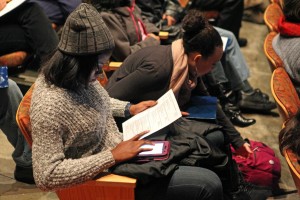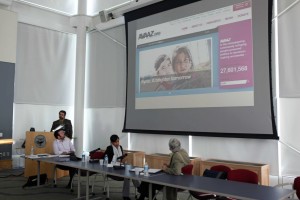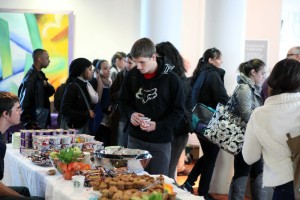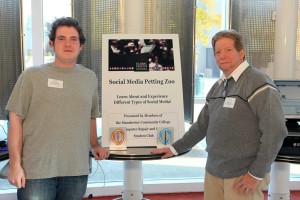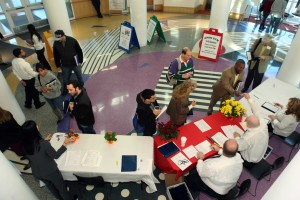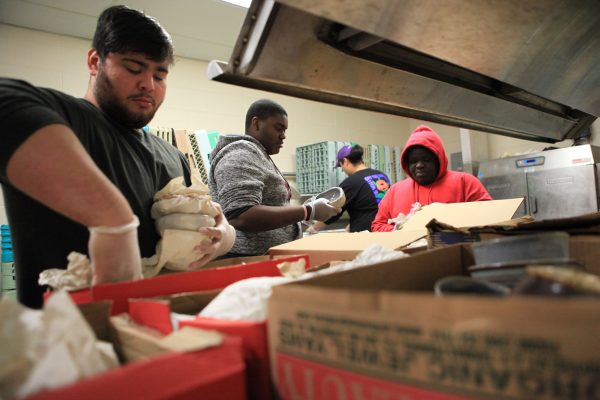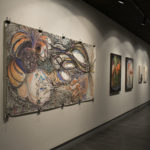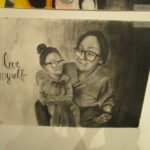GIC Draws 200 to MCC, Explores Social Media and Global Change
By Marco Vernacatola and Jesse Sweeney
Special to the Live Wire
As the blinds on the windows closed, obscuring the sun, the audience at the 24th Annual Global Issues Conference erupted into applause.
“We have very dark things going on in this culture,” said John Murphy, one of the event’s speakers, on Human Arts Media and Local Media Support, “and what we should do is embrace it, so we can expose it.”
More than 200 students, staffers and community came to the half-day event at Manchester Community College, Oct. 26, to focus on the theme “Understanding Social Media and Global Change.” The event was funded in part by several college groups, including the John Tirinzonie Scholarship Fund, the MCC Foundation and the Cultural Programs Committee.
While rapid changes in the role of social media in society, both for better and for worse, were the focus, the event was not all doom and gloom. Topics ranged widely, from the importance of social media in shaping revolutions happening throughout the world, such as the Arab Spring, to social media’s effects on individual personal and professional lives.
Sundeep R. Muppidi, who teaches at the University of Hartford and holds a doctorate in Mass Communications, was featured as the opening keynote speaker. He gave a broad overview of social media and the changes it has, and will continue, to make in the world citing the “shift from physical to ‘virtual’ communities.”
Muppidi noted both advantages and concerns regarding different practices, such as life-tracking used by many sites to target advertisements to users of social media. The convenience of being presented with items a user is interested in and more likely to purchase was pitted against the diminished levels of choice.
Does social media enhance individual freedom and choice or is it a way for others to exert subtle control, asked Muppidi?
In addition to keynotes delivered in the SBM Charitable Foundation Auditorium, smaller panel discussions were also held. Panelists included Michael E. Rawlins, a senior User-Experience Design Architect at ESPN, who promoted the professional power of the social media website “LinkedIn,” and Alexandra M. Merceron, a professor at the University of Connecticut and Middlesex Community College, who spoke about media use among Haitian immigrants to the United States.
The theme of the event was unity. While various speakers often warned the audience about how social media can destroy the traditional connections we experience with one another, they also spoke of the power social media can have to change the world by altering the distribution of power among governments, corporations and people.
In a panel focusing on Social Media and Communication Surveillance, presenter Brad Scharlott, pointed to Edward Snowden, who earlier this year released information about surveillance practices at the National Security Agency and is now seeking protection as a whistleblower in Russia, as an example of our eroding individual privacy.
“Absolute privacy in our digital age is impossible,” said Scharlott, who teaches at Northern Kentucky University. “Could the Watergate revelations have occurred under these conditions?”
When he was asked by a member of the audience what a person can do to protect themselves and their privacy, Scharlott gave a short answer: “self-censorship.” Meaning each individual has to be aware of what they put out into the world on their social media connections and in their Internet use.
Though the time we live in is particularly uncertain, the speakers at the event constantly spoke of the potential for it to get better and social media’s role in the improvement of our society.
“The dark things are the economic and social pressures that are going on today,” said Murphy during his panel, “We must engage polarities and find commonalities, or we will never be united.”
Attendees said they found the conference illuminating.
“It’s very informative and the topics are all interesting,” said student Alex Johnson.
Many of the audience members had attended previous Global Issues Conferences.
Thomas Stringfellow, an alumnus of MCC, said that he comes as often as he can to “stay informed on the issues.”


